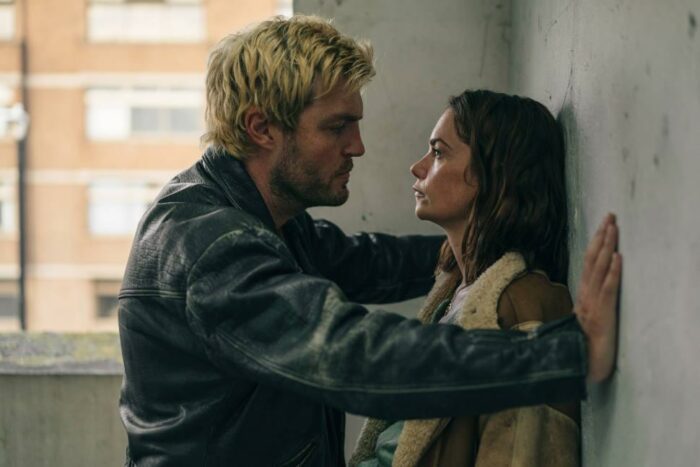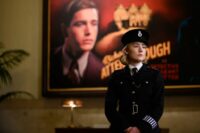After she delivered one of the most exciting feature debuts of the 2010s with the timeless romance Only You, whatever Harry Wootliff did next was always going to be one of my most anticipated releases. Although True Things doesn’t live up to the heights of her first film, and portrays a very different kind of romance, it still feels composed of much similar DNA, once again following a cagey adult woman into a relationship moving too fast. It echoes many previous British realist dramas about ordinary women at a crossroads in their lives, sharing a third act trip abroad with the likes of Shirley Valentine, Morvern Callar and Dirty God, but Wootliff manages to keep it from feeling redundant or derivative, largely by building the film on the shoulders of the excellent character work of Ruth Wilson.
Wilson plays Kate, a woman bored of her dead-end job at a benefits office (who wouldn’t be?) and dreaming of excitement that seemingly arrives in the form of ‘Blond’, another leonine performance from Tom Burke who seems to have become the go-to casting for the unreliable, mysterious, and toxic boyfriend of middle-class women waiting for something to tip them into a mental and emotional downward spiral. To the concern of all around her, the two begin a tentative non-relationship, spurred on by his impulsive, mysterious charisma and her need for the kind of freedom from responsibility his behavior typifies.

Quite early on in True Things you begin to wonder if ‘Blond’ may simply be a figment of Kate’s imagination. It would all fit, he only appears when she’s alone, never meaningfully interacts with any other characters and is always encouraging her to throw caution to the wind and pursue her most reckless, instantly gratifying impulses. Thankfully though, the film maintains this sense of ambiguity throughout it’s duration, with it remaining just a tantalizing piece of head-canon, rather than some contrived pseudo-psychological twist. Viewers can make up their own mind how real he is and more pertinently, think more critically about his story function and impact on Kate. If he’s a figment of her daydreaming imagination, why would she imagine this man in particular? He certainly does play Tyler Durden to her unreliable narrator, giving her license to reject the expectations of others and behave less crushingly responsibly.
It’s quite a familiar story, but it’s kept alive thanks to both Wootliff’s compelling commitment to verisimilitude and detail and to the strength of both lead performances. Burke remains a distinctly mystifying presence, here playing a different side to the same coin as his role in The Souvenir, projecting a brutish intensity and almost reassuring immaturity. As ever, Wilson shows what a talent she is, managing to make her character innately sympathetic, with her guarded disdain for the life and priorities she has been living up to now made viscerally credible. She’s clearly someone who has spent her entire life doing what she’s told and worrying about what others think, living a life into which ‘Blond’s’ sudden intrusion comes like a wrecking ball. She finds him intensely exciting and is painfully desperate for his approval, while he engages in his life with such casualness that he could well ghost her at any moment.
Some might well find True Things‘ languorous pace and reticence to provide easy pedagogic answers frustrating, and it’s rarely a comfortable watch, those expecting the love-struck euphoria and heartache of Only You will certainly receive a rude awakening. However, it would be a mistake to take it at face value as another romanticism of an emotionally abusive relationship. Ruth Wilson’s performance does a lot to lift it out of cliché and into the realm of psychological drama, with both her and Burke managing to avoid the stereotypes of their characters and lend some verisimilitude to their relationship. Above all, Wootliff and Wilson prioritize the character of Kate, her insecurity and indecisiveness, her desire and her frustration, making the tropes of a single 30-something looking for sun and sex feel urgent, elemental and painfully relatable.
Unlike a more conventional romantic drama or even romantic thriller, the “truth” alluded to in the title seems not to be in reference to any kind of deception. Every word out of ‘Blond’s’ mouth could be a lie, but that’s not the point. The “truth” of True Things is the more abstract sense of personal truth Kate is seeking: a sense of real worth and genuine fulfillment. Beneath the surface distractions Blond offers her, she’s a deeply unhappy and disaffected person searching for something to truly satisfy her. She’s a woman who has colored inside the lines for so long, she’s forgotten what kind of things she used to want to draw in the first place. That’s the truth: the real, unadulterated, liberated “her”; the nebulous “something real” that we’re all seeking in our own lives. The answer to the question: what do we want when no one—not our parents, not our friends, not the media—is telling us what we should want?



